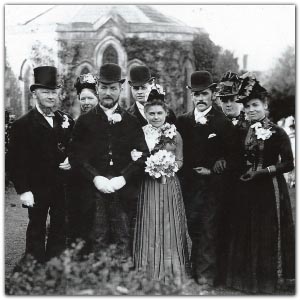
Victorian Sources for Historians Course
Build your knowledge of Victorian sources in this ten week course.
The nineteenth century is a treasure trove of documents relating to the lives of our Victorian forebears. A selection of these sources will be used to provide context and a sense of period, whilst developing our knowledge of what is available from museums, archives, libraries and record offices. During the course we will consider the type of sources available and using a themed approach uncover what life was like in the 19th century, a period that witnessed profound change and development. There will also be an opportunity to apply learning in a small project.
Session dates:October 6th, 13th, 20th & 27th, November 3rd, 10th, 17th & 24th and December 1st & 8th
All sessions: 2 – 4pm
|
Week 1 |
Introduction – overview of course and the variety of sources that are available, their reliability and how to use them. |
|
Week 2 |
Society and Class – during the 19th century social class became more complex and working life more demanding, here we will have as our focus working life of the masses. |
|
Week 3 |
Family – looking at sources that can help us understand family life and structure. |
|
Week 4 |
Health and Hygiene – as the urban population increased the health of the population became increasingly compromised, here we look at sources that show how precarious life could be. |
|
Week 5 |
Built Environment – the 19th century has become notorious for its slum housing, but there is still a huge amount of Victorian building still in use today. Here we use sources to find out about living conditions. |
|
Week 6 |
Education – during the 19th century the building blocks of today’s education system were laid down. Here we look at what sources can tell us about it’s progress. |
|
Week 7 |
Travel, Transport and Communication – a time of great change and technological development, sources will help us assess the impact on the population. |
|
Week 8 |
Popular Culture – it was not all work and no play. Leisure time for the masses became bid business and we shall use sources to find out exactly how the Victorians enjoyed themselves. |
|
Week 9 |
Crime and Punishment – many of the Victorian prisons are still in use today, but conditions are vastly different. Using various sources we will look at attitudes towards crime and the treatment of prisoners. |
|
Week 10 |
Conclusion – students will present their projects and we will have an overview of the themes and sources. |
Tickets are £125 (society members £115) – which covers all ten sessions. Pre-booking is required, because joining instructions will be sent by email to all attendees in advance. Bookings therefore close one day before the event.
To be able to join this online course, you will need a computer device which has speakers and a microphone. Ideally, also a webcam. You need to be able to access your emails from this device. First-time users will be asked to download a small piece of software, this will be sent to you in advance. Technical help is available for those who need further assistance, please contact booking@berksfhs.org.uk
To book – scroll down.
Speaker
-
 Dr Margaret Simons
Dr Margaret SimonsDr Margaret Simons is a much respected local historian whose doctoral thesis (University of Reading) examined the public health and housing of the working classes in Reading from 1837 to 1939. She is a tutor at Oxford University Department of Continuing Education, Bracknell and Wokingham College and Workers’ Educational Organisation.
Margaret is also a trustee of the Mills Archive Trust, secretary of Berkshire Record Society and sits on the committee of the Berkshire Local History Association.
